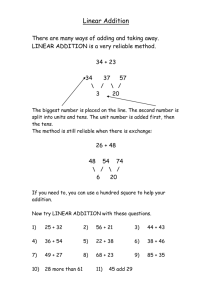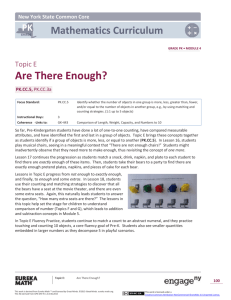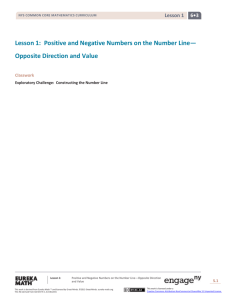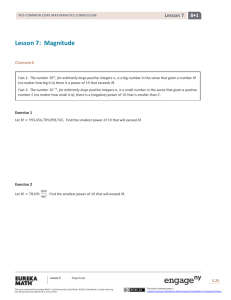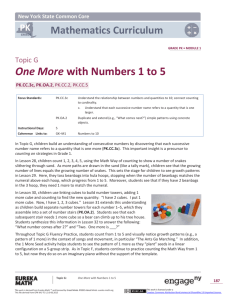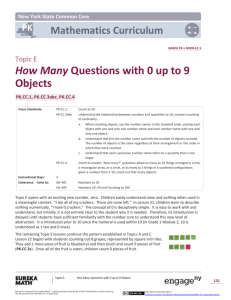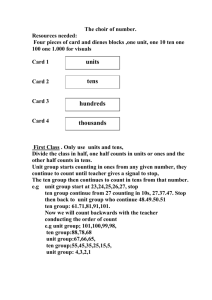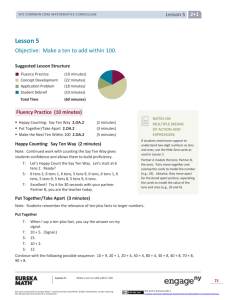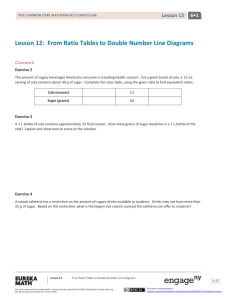Lesson 18 - EngageNY
advertisement
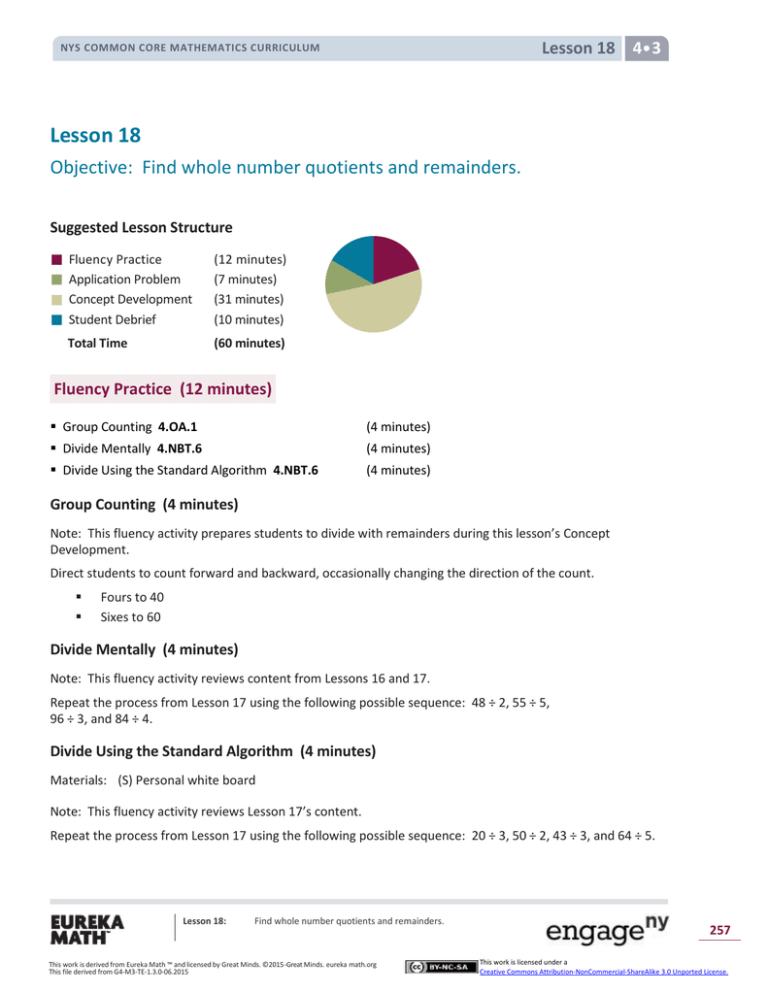
Lesson 18 4 3 NYS COMMON CORE MATHEMATICS CURRICULUM Lesson 18 Objective: Find whole number quotients and remainders. Suggested Lesson Structure Fluency Practice Application Problem Concept Development Student Debrief Total Time (12 minutes) (7 minutes) (31 minutes) (10 minutes) (60 minutes) Fluency Practice (12 minutes) Group Counting 4.OA.1 (4 minutes) Divide Mentally 4.NBT.6 (4 minutes) Divide Using the Standard Algorithm 4.NBT.6 (4 minutes) Group Counting (4 minutes) Note: This fluency activity prepares students to divide with remainders during this lesson’s Concept Development. Direct students to count forward and backward, occasionally changing the direction of the count. Fours to 40 Sixes to 60 Divide Mentally (4 minutes) Note: This fluency activity reviews content from Lessons 16 and 17. Repeat the process from Lesson 17 using the following possible sequence: 48 ÷ 2, 55 ÷ 5, 96 ÷ 3, and 84 ÷ 4. Divide Using the Standard Algorithm (4 minutes) Materials: (S) Personal white board Note: This fluency activity reviews Lesson 17’s content. Repeat the process from Lesson 17 using the following possible sequence: 20 ÷ 3, 50 ÷ 2, 43 ÷ 3, and 64 ÷ 5. Lesson 18: Find whole number quotients and remainders. This work is derived from Eureka Math ™ and licensed by Great Minds. ©2015 -Great Minds. eureka math.org This file derived from G4-M3-TE-1.3.0-06.2015 257 This work is licensed under a Creative Commons Attribution-NonCommercial-ShareAlike 3.0 Unported License. NYS COMMON CORE MATHEMATICS CURRICULUM Lesson 18 4 3 Application Problem (7 minutes) Malory's family is going to buy oranges. The Grand Market sells oranges at 3 pounds for 87 cents. How much does 1 pound of oranges cost at Grand Market? Note: This Application Problem reviews division with a remainder in the tens from Lesson 17. Concept Development (31 minutes) Materials: (T) Tens place value chart (Lesson 16 Template) (S) Personal white board, tens place value chart (Lesson 16 Template) Problem 1: Divide a two-digit number by a one-digit divisor with a remainder in the tens place. 5 tens 7 ones ÷ 3 T: S: T: S: T: S: T: T: S: T: S: T: T: S: T: (Write 57 ÷ 3.) Let’s divide 57 into 3 equal groups. Break 57 into tens and ones. 5 tens 7 ones. Let’s divide 5 tens first. Why? When we divide, we always start with the larger units. We divide the tens first because we may have to change tens for ones. 5 tens divided by 3…? (Record the steps of the algorithm.) 1 ten in each group, with 2 tens remaining. NOTES ON We’ve distributed 3 tens. Let’s write 3 in the tens MULTIPLE MEANS place. We also write that there are 2 tens remaining OF ACTION AND because 5 tens minus 3 tens is 2 tens. EXPRESSION: How do we divide the remaining 2 tens? Scaffold long division with the We unbundle the 2 tens as 20 ones. following options: Yes. So, how many ones do we have altogether? Provide graph paper for easy 27. alignment of tens and ones. Label the tens and ones places. Yes, 20 ones plus 7 ones is 27 ones. Write zeros as place holders. You know your threes facts. Get ready for some mental math. What’s 27 ones divided by 3? 9 ones! 9 ones in each group is recorded above, in the ones place. Record the remaining steps. Read the quotient. Lesson 18: Find whole number quotients and remainders. This work is derived from Eureka Math ™ and licensed by Great Minds. ©2015 -Great Minds. eureka math.org This file derived from G4-M3-TE-1.3.0-06.2015 258 This work is licensed under a Creative Commons Attribution-NonCommercial-ShareAlike 3.0 Unported License. NYS COMMON CORE MATHEMATICS CURRICULUM S: T: S: T: S: Lesson 18 4 3 (Record the remaining steps.) 19. Say the division sentence. 57 divided by 3 is 19. Check with multiplication. What’s 19 times 3? 57. Problem 2: Divide with a remainder in the tens and ones places using the division algorithm. 8 tens 6 ones ÷ 5 T: S: T: S: T: T: S: T: S: T: S: T: T: S: T: S: T: (Write 86 ÷ 5.) You solved 57 divided by 3 by unbundling tens. Let’s try a more challenging problem. How many groups will we divide 86 into? 5. What is the first step? Start with the tens. Divide 8 tens into 5 groups. That’s 1 ten in each group with 3 tens remaining. Show me on your personal white board using long division, or the division algorithm, how you recorded the distributed tens and the remaining tens. What will you do with the 3 remaining tens? Unbundle 3 tens as 30 ones. How many ones altogether? 36. Next step? Divide 36 ones into 5 groups. That’s 7 ones in each group, with 1 one remaining. How did you record what you distributed? What remains? Check your neighbor’s work. Thumbs up if you agree. I see you’ve written 35 ones distributed under the 36 ones you had at first. Did you write R1? Read your quotient. Read your remainder. What is 86 divided by 5? 17 with a remainder of 1. How could you prove your division is correct? Multiply 17 by 5, and then add 1 more. Work with your partner to check with multiplication. Lesson 18: Find whole number quotients and remainders. This work is derived from Eureka Math ™ and licensed by Great Minds. ©2015 -Great Minds. eureka math.org This file derived from G4-M3-TE-1.3.0-06.2015 259 This work is licensed under a Creative Commons Attribution-NonCommercial-ShareAlike 3.0 Unported License. NYS COMMON CORE MATHEMATICS CURRICULUM Lesson 18 4 3 Problem 3: Use mental math to divide and calculate a remainder. 7 tens 4 ones ÷ 8 T: S: T: MP.5 S: T: S: T: S: (Write 74 ÷ 8.) You’ve unbundled tens, and you’ve written remainders in the quotient. Now, take a look at this problem. What’s tricky here? Hey! We can’t divide 7 tens into 8 groups! What will we do? We’ll think of our eights facts. I’m thinking of an eights fact whose product is close to 74. Can you guess? 72. 8 times 9 is 72. Nice job! But 72 is only part of 74. What’s the other part? NOTES ON 2. MULTIPLE MEANS What is 74 divided by 8? OF ENGAGEMENT: 74 divided by 8 is 9 with a remainder of 2. Students who have not memorized Continue with 87 ÷ 9 and 64 ÷ 7. Gradually omit the number bond, and encourage mental math. Problem Set (10 minutes) Students should do their personal best to complete the Problem Set within the allotted 10 minutes. For some classes, it may be appropriate to modify the assignment by specifying which problems they work on first. Some problems do not specify a method for solving. Students should solve these problems using the RDW approach used for Application Problems. eights or nines facts may not be ready to use mental math to solve 74 ÷ 8. Adjust the numbers, or provide a multiplication chart. Approach Problems 11 and 12 of the Problem Set similarly if students have not memorized sevens and eights facts. Student Debrief (10 minutes) Lesson Objective: Find whole number quotients and remainders. The Student Debrief is intended to invite reflection and active processing of the total lesson experience. Invite students to review their solutions for the Problem Set. They should check work by comparing answers with a partner before going over answers as a class. Look for misconceptions or misunderstandings that can be addressed in the Debrief. Guide students in a conversation to debrief the Problem Set and process the lesson. Lesson 18: Find whole number quotients and remainders. This work is derived from Eureka Math ™ and licensed by Great Minds. ©2015 -Great Minds. eureka math.org This file derived from G4-M3-TE-1.3.0-06.2015 260 This work is licensed under a Creative Commons Attribution-NonCommercial-ShareAlike 3.0 Unported License. NYS COMMON CORE MATHEMATICS CURRICULUM Lesson 18 4 3 Any combination of the questions below may be used to lead the discussion. Compare the remainders to the divisors on the Problem Set. What do you find is true? Which always has a larger value? Why is that? How did the zero effect your division in Problem 9? What did you notice about the divisor, the whole, and quotients in Problems 9 and 10? Can you predict whether or not there will be a remainder? How? The whole is the same in Problems 11 and 12. Why is the quotient smaller in Problem 11? Exit Ticket (3 minutes) After the Student Debrief, instruct students to complete the Exit Ticket. A review of their work will help with assessing students’ understanding of the concepts that were presented in today’s lesson and planning more effectively for future lessons. The questions may be read aloud to the students. Lesson 18: Find whole number quotients and remainders. This work is derived from Eureka Math ™ and licensed by Great Minds. ©2015 -Great Minds. eureka math.org This file derived from G4-M3-TE-1.3.0-06.2015 261 This work is licensed under a Creative Commons Attribution-NonCommercial-ShareAlike 3.0 Unported License. Lesson 18 Problem Set 4 3 NYS COMMON CORE MATHEMATICS CURRICULUM Name Date Solve using the standard algorithm. Check your quotient and remainder by using multiplication and addition. 1. 46 ÷ 2 2. 96 ÷ 3 3. 85 ÷ 5 4. 52 ÷ 4 5. 53 ÷ 3 6. 95 ÷ 4 Lesson 18: Find whole number quotients and remainders. This work is derived from Eureka Math ™ and licensed by Great Minds. ©2015 -Great Minds. eureka math.org This file derived from G4-M3-TE-1.3.0-06.2015 262 This work is licensed under a Creative Commons Attribution-NonCommercial-ShareAlike 3.0 Unported License. Lesson 18 Problem Set 4 3 NYS COMMON CORE MATHEMATICS CURRICULUM 7. 89 ÷ 6 8. 9. 60 ÷ 3 10. 60 ÷ 4 11. 95 ÷ 8 12. 95 ÷ 7 Lesson 18: 96 ÷ 6 Find whole number quotients and remainders. This work is derived from Eureka Math ™ and licensed by Great Minds. ©2015 -Great Minds. eureka math.org This file derived from G4-M3-TE-1.3.0-06.2015 263 This work is licensed under a Creative Commons Attribution-NonCommercial-ShareAlike 3.0 Unported License. Lesson 18 Exit Ticket 4 3 NYS COMMON CORE MATHEMATICS CURRICULUM Name Date Solve using the standard algorithm. Check your quotient and remainder by using multiplication and addition. 1. 93 ÷ 7 2. 99 ÷ 8 Lesson 18: Find whole number quotients and remainders. This work is derived from Eureka Math ™ and licensed by Great Minds. ©2015 -Great Minds. eureka math.org This file derived from G4-M3-TE-1.3.0-06.2015 264 This work is licensed under a Creative Commons Attribution-NonCommercial-ShareAlike 3.0 Unported License. Lesson 18 Homework 4 3 NYS COMMON CORE MATHEMATICS CURRICULUM Name Date Solve using the standard algorithm. Check your quotient and remainder by using multiplication and addition. 1. 84 ÷ 2 2. 84 ÷ 4 3. 48 ÷ 3 4. 80 ÷ 5 5. 79 ÷ 5 6. 91 ÷ 4 Lesson 18: Find whole number quotients and remainders. This work is derived from Eureka Math ™ and licensed by Great Minds. ©2015 -Great Minds. eureka math.org This file derived from G4-M3-TE-1.3.0-06.2015 265 This work is licensed under a Creative Commons Attribution-NonCommercial-ShareAlike 3.0 Unported License. Lesson 18 Homework 4 3 NYS COMMON CORE MATHEMATICS CURRICULUM 7. 91 ÷ 6 8. 9. 87 ÷ 3 10. 87 ÷ 6 11. 94 ÷ 8 12. 94 ÷ 6 Lesson 18: 91 ÷ 7 Find whole number quotients and remainders. This work is derived from Eureka Math ™ and licensed by Great Minds. ©2015 -Great Minds. eureka math.org This file derived from G4-M3-TE-1.3.0-06.2015 266 This work is licensed under a Creative Commons Attribution-NonCommercial-ShareAlike 3.0 Unported License.
